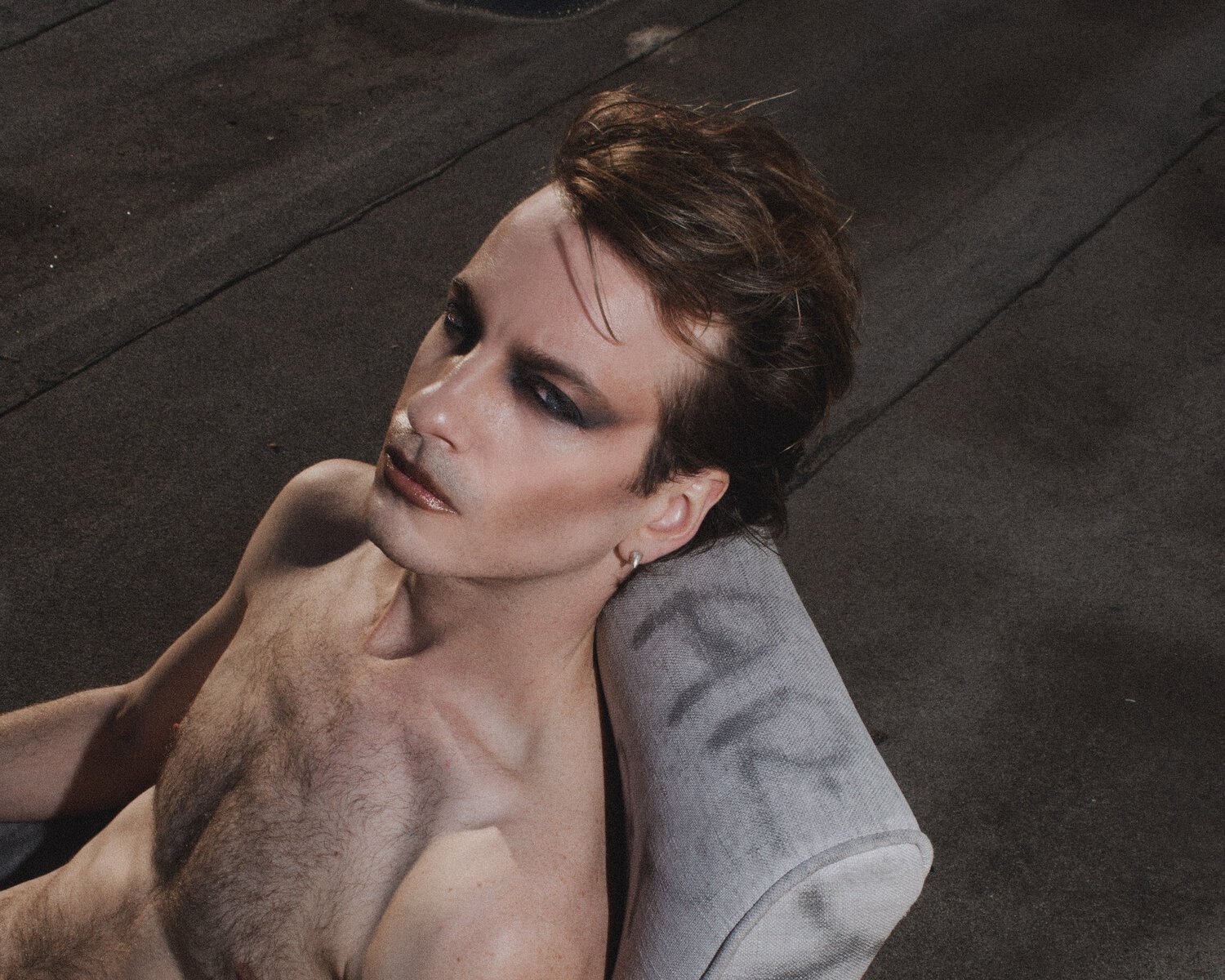Interview: TR/ST on overcoming creative doubt and why he's grateful to be queer
This interview originally ran on the cover of WUSSY vol.06, which is now sold out.
To order a copy of our most recent print volumes, click here.
A strobe and a beat fostered queer expressions years before our lives and stories clawed their way into the mainstream. Historically, clubs — and the music they played — have catered to and been shaped by alternative communities. Like all things us, eventually the straights would co-opt it, and the unmistakably gay and black beginnings of house music would eventually (d)evolve into the EDM stylings of Diplo and Calvin Harris. Nonetheless, the dance floor remains an emotional place for queers. This is something Robert Alfons of TR/ST innately understands.
Since the electro-goth uniform’s debut in 2012, TR/ST (pronounced “trust”) has been compared to fellow Canadian electronic group Crystal Castles. Both create moody, synth-heavy tracks, but while listening to the latter inspires ascension, TR/ST’s work invites you inwards, to terrifying effect. The opening of “Sulk” — synthed sirens followed by a pulsing drum — eerily reminds me of that time I took a double-dose of Molly when I was 19. You know that feeling of sinking, only buoyed by frantic, sweaty movement? Then Alfons’ vocals come in, delivered as if the melody is nipping at his heels, croaking, “He’s bound to fall...”
But just because TR/ST’s songs can, at times, evoke a bad trip, doesn’t make it bad music. On the contrary, like substance-induced therapy sessions, it’s often revealing.
TR/ST originally began as a collaboration with Maya Postepski. Their debut record garnered them praise (and an audience) for its dark, Berlin sex club atmosphere. Tracks “Gloryhole”, “This Ready Flesh”, and “Candy Walls” suggest eroticism and drugs, while “Sulk” and “The Last Dregs” make you question whether or not this indulgence is a good thing. Like any proper night out, there’s unpredictability: melodies and lyrics are often ditched mid-track, replaced by vacuous sounds and Alfons making noise. In contrast to most dance music which is built around the idea of release, TR/ST’s early work purposely never gets there; living in the moment before, during, and after you’ve done and taken everything you can to transcend but realize you’re still sad.
Speaking with Alfons, it’s hard to believe such extremes exist within him. Soft-spoken and polite (he’s Canadian, lest we forget), the 31-year-old is originally from Winnipeg. Growing up in a supportive home in the country’s coldest city, he played piano and listened to Sarah McLachlan. Not exactly a childhood that would seemingly source future lyrics like, “I am naked / I am ravaged” — at least, that’s what it sounds like Alfons is singing in “Bicep.” He tells me websites like Genius often misquote his lyrics. However, he isn’t eager to correct them, writing in a follow-up email, “The last thing I want is people to think there’s a strict way of how to experience and interpret a song.”
Over the phone, he can occasionally come across as withholding, not eager to expand on his answers. Or perhaps he’s just not terribly comfortable talking about himself. This is his first press interview in a while, he confesses. It’s been over five years since a full album dropped, a delay he attributes to both “professional and personal” reasons. Following Postepski’s departure, Alfons pivoted towards pop. TR/ST’s sophomore album Joyland featured lighter and dreamier production: “Capitol” and “Are We Arc?” are the outfit’s most radio-friendly singles to date, yet Alfons’ lyrics remained obscured, both sonically and conceptually.
PHOTOGRAPHY BY MATEUS PORTO
When asked if the poetic vagueness of phrases like “Give her lengths of love / But the body is gone” is purposeful, he seems put off by the question. His songwriting process is nonlinear, he explains, shaped around achieving a “feeling” and using melody and lyrics as a means of expressing the desired emotion. While he admits a good deal of his work deals with sexual repression and shame, like most of his verses, he’s not interested in divulging specifics. Are songs inspired by exes? Sure. Which ones? No way. “I can't control how people feel. I hope they listen, I hope they have strong reactions to the music whether good or bad,” he concludes.
Alfons recently moved from Toronto to Los Angeles, where he says he’s spent much of the past five years healing and gardening. He teased new music with “Bicep” in 2017, but it’d be at least another year and half before TR/ST fans got any formal word on the new record. “[The most challenging aspect was] overcoming the voice that says this isn't good enough,” he admits, “I always don't think I’m good enough.” In the time spent not tending to himself or the earth, he’s been working on a new two-part LP entitled The Destroyer, which will see him reunite with Maya Postepski on several tracks. Surprisingly, the lead single “Gone” treats Alfons’ vocals as the centerpiece of the production — not dissimilar to his pre-TR/ST musical experimentations like “Nostalgia.” His voice minimally distorted, he sings to a dissolved love, “Did I ever tell you I need you? / To lead me through the fog.”
Alfons identity often peaks through in his lyrics. “I am so grateful to be queer,” he says, “it has given me a higher level of empathy and solidarity with others.” A gay listener will often find familiar sentiments: desire, sex, alienation. However, pronouns and narratives are characteristically blurred with TR/ST’s particular brand dancefloor chaos. “I am getting used to the loneliest of sounds,” he sings on “Are We Arc?”
We’re left to fill in the rest of the dots ourselves, but maybe that’s the point. TR/ST’s music is crafted to be evocative, so perhaps Alfons’ cageiness about his own inspiration is to not step on our projections. “I hate… buying an album and flipping through the booklet for pictures, and there are lyrics just right there. I listen to a song for years and years, and then get attached to the lyrics that I thought they were,” he told Electronic Beats in 2012.
Describing his decision to split Destroyer into two parts, he told me, “I think it's important to be patient and put things out when you're ready,” alluding to how with the advent of digital streaming, individual tracks can be overlooked by listeners, “but there's only so long that you can be precious about things.” By releasing Destroyer as two separate LPs, Alfons is ensuring each track gets its due. A decision that also suggests Alfons is an artist more interested in curating his audience’s experience than he lets on. He appears more comfortable discussing his garden than his music. “My next project is growing olives, I find those trees so incredibly gorgeous,” he gushes, “I'm obsessed with starting the process of growing them and the transformation of this fruit that's essentially impossible to eat unless you salt them or press them into oil.”
PHOTOGRAPHY BY MATEUS PORTO
You could read into this affinity for olives as a metaphor for Alfons’ creative process: raw and bitter emotions only made digestible through melodic salting — but trying too hard to distill the precise meaning of his music seems to be missing the point. By keeping his work’s emotional citations private, [Alfons] preserves the connections we’ve created: music for us that might as well have been written by us. If your experience of TR/ST is primarily alone on a dance floor, club or bedroom, the only interpretations that matter are your own.
When asked about the group’s mystique in another interview, he responded plainly, “The whole thing doesn’t seem mysterious to me.” Robert Alfons can most likely chart his personal pain, growth, and inspiration — but that’s for him. We’re not entitled to know the cause or cure for his fog. Maybe a feeling is enough. Maybe we should just trust the music and dance.
TR/ST’s latest albums The Destroyer - 1 and The Destroyer - 2 are now available for purchase or streaming. You can visit www.tr-st.xyz for merch and upcoming tour dates.
—
Jacob Seferian is a Texas-bred journalist living in New York City. You can follow him on Twitter and Instagram at @disco__bitch. That's disco, two underscores, bitch.
Photography by Mateus Porto
Archive
- February 2025
- November 2024
- October 2024
- September 2024
- August 2024
- July 2024
- June 2024
- May 2024
- April 2024
- October 2023
- July 2023
- June 2023
- May 2023
- April 2023
- March 2023
- February 2023
- June 2022
- April 2022
- March 2022
- January 2022
- December 2021
- October 2021
- September 2021
- August 2021
- July 2021
- June 2021
- May 2021
- April 2021
- March 2021
- February 2021
- January 2021
- December 2020
- October 2020
- September 2020
- August 2020
- July 2020
- June 2020
- May 2020
- April 2020
- March 2020
- February 2020
- January 2020
- December 2019
- November 2019
- October 2019
- September 2019
- August 2019
- July 2019
- June 2019
- May 2019
- April 2019
- March 2019
- February 2019
- January 2019
- December 2018
- November 2018
- October 2018
- September 2018
- August 2018
- July 2018
- June 2018
- May 2018
- April 2018
- March 2018
- February 2018
- January 2018
- December 2017
- November 2017
- October 2017
- September 2017
- August 2017
- July 2017
- June 2017
- May 2017
- April 2017
- March 2017
- February 2017
- January 2017
- December 2015
- November 2015
- October 2015
- September 2015
- August 2015
- July 2015
- June 2015
- May 2015
- April 2015












